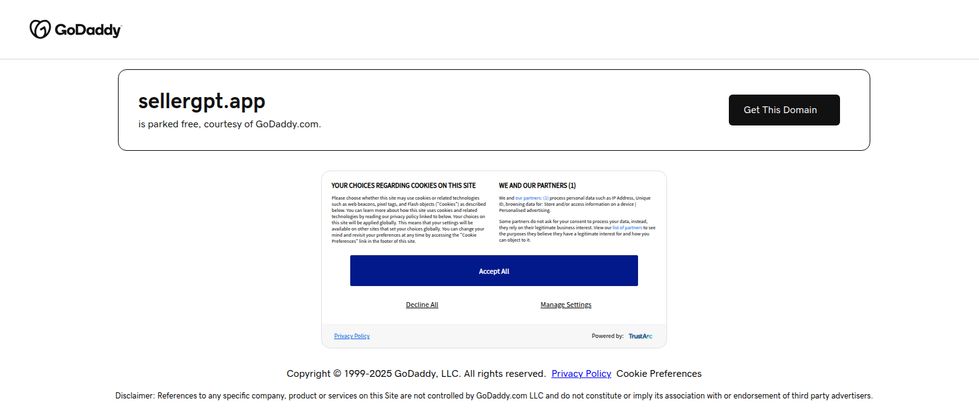If you're an Amazon seller, you've felt it. That soul-crushing moment when you're staring at a blank product description box, trying to summon the creative energy to write 2,000 characters about a silicone spatula. Again. You have to be persuasive, hit all the features, and somehow cram in a dozen keywords without sounding like a robot from a 1950s B-movie. It’s a grind.
For years, we've been doing this dance with Amazon's A9 algorithm, a mysterious beast that changes its mind more often than I change my socks. We read the blogs, we watch the YouTube gurus, we A/B test until our eyes cross. But the game is changing. Fast.
AI copywriting assistants have burst onto the scene, and yeah, they’re pretty darn good. I've played around with all the big names. But most of them are generalists. They can write a blog post, a tweet, a love poem… and an Amazon listing. But a jack-of-all-trades is a master of none, right? That's why my ears perked up when I heard whispers about a tool called SellerGPT. A specialist. An AI supposedly built from the ground up for one thing and one thing only: conquering the Amazon marketplace.
So, naturally, I went to check it out at sellergpt.app. And… well, it was a ghost town. A GoDaddy parked domain page. A digital tumbleweed. But the idea of it, the concept behind what it's supposed to do? That's too juicy not to talk about. So let's pull back the curtain on the promise of SellerGPT, whether it’s a phantom or just waiting in the wings.
What Exactly is SellerGPT Supposed to Be?
From what I've gathered, SellerGPT isn't just another ChatGPT wrapper with a fancy name. The concept is an AI platform that has been fed a very specific diet: successful Amazon listings, A9 algorithm documentation, and conversion-focused e-commerce copy. Think of it less like a general-purpose writing tool and more like a highly trained apprentice who has spent 10,000 hours studying only what makes a product sell on Amazon.
Why does that matter? Because selling on Amazon is its own unique universe with its own laws of physics. The A9 algorithm doesn't care about beautiful prose or clever puns nearly as much as it cares about keyword relevance, sales velocity, and conversion rates. A tool that understands these priorities innately could be a massive shortcut. It's the difference between asking a talented family doctor to perform brain surgery and hiring an actual neurosurgeon. Both are smart, but you only want one of them messing with your brain… or your Amazon sales.
The Core Features That Got My Attention
Based on the specs I've seen floating around, the platform hangs its hat on two main pillars. And frankly, they're the only two that really matter for sellers.
AI-Powered Listing Content Generation
This is the bread and butter. The whole point is to feed it some basic product information—what it is, what it does, who it's for, key specs—and have it spit out fully-formed listing components. We’re talking:
- Compelling Titles: Packed with the most critical keywords while still being readable to a human.
- Persuasive Bullet Points: Five chances to seal the deal, blending features with benefits that solve a customer's problem.
- Detailed Product Descriptions: The long-form content that can sway the analytical shoppers and give you more room for secondary keywords.
Imagine cutting down the time it takes to launch a new product by 70 or 80%. No more staring at that blinking cursor. No more writer's block. Just a solid, optimized foundation that you can then tweak to perfectly match your brand's voice. That’s the dream, anyway.

Visit Amazon Listing AI
Deep-Seated Amazon Algorithm Optimization
This is the feature that separates the pretenders from the contenders. It's one thing to write nice-sounding copy. It’s another thing entirely to write copy that the A9 algorithm falls in love with. A tool like SellerGPT is supposedly designed to think like the algorithm.
This means it inherently understands things like keyword placement and density. It knows that the most important keywords need to be in the title. It knows how to weave in latent semantic indexing (LSI) keywords—those related terms that Amazon's algorithm uses to understand context—throughout the bullets and description. It could even help generate backend search terms, a task that feels like pure guesswork for even seasoned sellers. In my experience, this is where most people leave money on the table. They write for humans or for robots, but rarely for both at once. A properly trained AI could bridge that gap perfectly.
The Potential Upsides of a Tool Like SellerGPT
Okay, let's get down to it. What's the real-world impact? First off, the time-saving element is a no-brainer. Think of all the hours you spend writing, rewriting, and second-guessing your copy. Getting that time back to focus on sourcing, PPC, or customer service is a massive win. For a solo entrepreneur or a small team, that's not a luxury; it's a lifeline.
Then there's the raw performance boost. This isn't just about saving time; it's about making more money. A properly optimized listing gets indexed for more keywords, ranks higher in search results, and ultimately, gets more clicks. More clicks from relevant shoppers lead to higher conversion rates. Higher conversion rates tell the A9 algorithm that your product is a winner, which boosts your rank even further. It’s a beautiful, self-perpetuating cycle of success, a flywheel effect. And the right AI tool could be the initial push that gets it spinning.
Finally, there's the adaptability. Amazon doesn't send out a memo when they tweak the A9 algorithm. It just… changes. Things that worked last month suddenly don't. A dedicated platform like SellerGPT would, in theory, be constantly updated and retrained on the latest data, helping you stay ahead of the curve without having to become a full-time algorithm detective.
Let's Be Real: The Potential Downsides and Caveats
Of course, no tool is a magic wand. I've been in this game long enough to know that you can't just set it and forget it. The first big caveat is the need for a human touch. I would never just copy and paste AI-generated content directly into a listing without a thorough review. Your brand voice is your unique fingerprint. An AI can mimic it, but it can’t replace your authentic story and passion. You still need to be the final editor, ensuring accuracy and injecting personality.
The second major point is the classic “garbage in, garbage out” principle. An AI is only as good as the information you give it. If you provide lazy, one-word descriptions of your product, you’re going to get lazy, generic output. To get the most out of a tool like this, you need to provide detailed, thoughtful input about your target audience, their pain points, and what makes your product genuinely special. The AI is a powerful assistant, not a mind reader.
The Million-Dollar Question: What About Pricing?
This is where the trail goes cold. With the website being a parked domain, there's obviously no pricing page to look at. It's a bit of a head-scratcher. Is this a project that was abandoned? Is it in a closed beta? It's hard to say.
However, we can speculate based on the current market for SEO and AI tools. A tool this specialized would likely run on a subscription model. I could see a tiered system, perhaps based on the number of listings you can generate per month. Something like a starter plan for $29-$49/month for small sellers, and more robust plans climbing into the hundreds for agencies and large brands. It's all just guesswork, but it wouldn't be out of line with what similar SaaS platforms charge. If anyone reading this has the inside scoop, please, for the love of all that is holy, drop a comment below!
My Final Take: A Promising Ghost or a Future Phenom?
So, what's the verdict on SellerGPT? It's an enigma, wrapped in a riddle, and parked on a GoDaddy server. The concept is a 10/10. An AI built specifically to navigate the treacherous waters of Amazon's A9 algorithm is exactly what the modern seller needs. It promises to save time, reduce headaches, and most importantly, improve the metrics that actually lead to more sales.
The execution, however, is a total unknown. The fact that the domain is parked is… not a great sign. But it doesn't mean the idea is dead. Great ideas in tech have a way of resurfacing. Whether SellerGPT.app itself ever materializes or another, similar tool rises to take its place, one thing is crystal clear to me: AI-driven listing optimization is shifting from a 'nice-to-have' novelty to an absolute necessity. The days of just 'winging it' on your product copy are numbered. The future of Amazon success will belong to those who best combine human strategy with artificial intelligence.
Frequently Asked Questions about SellerGPT
- 1. What is SellerGPT?
- SellerGPT is conceptualized as a specialized AI platform designed specifically for Amazon sellers. Its purpose is to generate highly optimized product listing content—like titles, bullet points, and descriptions—that is tailored to rank well within Amazon's A9 search algorithm and convert shoppers into customers.
- 2. How is SellerGPT different from using ChatGPT or Jasper?
- While general AI tools like ChatGPT are powerful, they are not specialists. SellerGPT's core difference is its specific training on Amazon's ecosystem. It's designed to understand the nuances of the A9 algorithm, keyword relevance, and the specific copy style that leads to conversions on the platform, which a general tool may not prioritize.
- 3. Can I rely solely on an AI tool for my Amazon listings?
- In my professional opinion, no. AI tools should be used as powerful assistants, not replacements for human oversight. It's critical to review and edit any AI-generated content to ensure it is factually accurate, on-brand, and has that essential human touch. Think of it as a 90% solution that you need to take over the finish line.
- 4. Is SellerGPT currently available for use?
- As of late 2023, the official website for SellerGPT (sellergpt.app) appears to be an inactive, parked domain. This suggests the tool is not publicly available, may be in a private development phase, or the project may be on hold. Its future is currently uncertain.
- 5. What are the main benefits of using an AI for Amazon listings?
- The primary benefits are threefold: significant time savings in the content creation process, improved listing optimization to rank higher for more keywords, and the potential for increased conversion rates and sales by creating more persuasive and algorithm-friendly copy.
References and Sources
- To see the current status of the domain discussed: sellergpt.app (via GoDaddy)
- For a deeper understanding of the Amazon algorithm: Amazon A9 Algorithm Explained by Search Engine Journal
- General reading on AI's impact on e-commerce: How AI Is Reshaping The E-Commerce Landscape via Forbes



